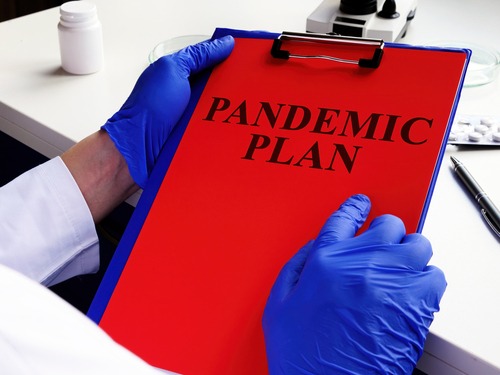
A bipartisan group including U.S. Sens. Tammy Baldwin (D-WI), Susan Collins (R-ME), Jacky Rosen (D-NV), and Lisa Murkowski (R-AR) introduced legislation on Thursday that would bolster the country’s ability to respond to future public health emergencies.
The Bolstering Infectious Outbreak (BIO) Preparedness Workforce Act would focus on retaining and recruiting clinicians and public health care professionals by establishing a new student loan repayment program for infectious disease clinicians and other public health preparedness and response professionals in the health care setting.
“The COVID-19 pandemic put a major strain on our health care system, especially among our infectious diseases clinical workforce and public health professionals who specialize in bio-preparedness. This bipartisan legislation will strengthen our workforce to help get through this pandemic and make sure we are better prepared for future public health emergencies,” Baldwin said. “We need to use all the tools in the toolbox to be better prepared, and that starts with making sure we support and grow our infectious disease and pandemic preparedness workforce.”
The senators said that COVID-19 exposed gaps and weaknesses in the nation’s preparedness for public health emergencies, including an insufficient infectious disease workforce focused on outbreak preparedness and response in health care settings. A June study found that 208 million Americans live in areas with little or no access to an infectious disease provider. Additionally, only 75 percent of infectious diseases training programs were able to fill all their slots.
The BIO Preparedness Workforce Act would provide qualified individuals with up to $50,000 of student loan repayment per year for each year of service, up to $150,000.
“We need to encourage students to pursue careers in health care and eliminate barriers to getting this vital training — such as nursing faculty shortages or financial disincentives to pursuing certain specialties,” Collins said. “The ongoing public health emergency has underscored the importance of investing in a robust medical workforce. Our bipartisan bill would establish a new student loan repayment program for infectious disease professionals, attracting more students to this critical field and helping our nation prepare for future crises.”
The legislation is supported by multiple medical organizations, including Johns Hopkins Center for Health Security, Infectious Diseases Society of America, American Medical Association, American Hospital Association, American Association of Medical Colleges, National Rural Health Association, and Association of Professionals in Infection Prevention and Epidemiology, among others.
“The COVID-19 pandemic has dramatically highlighted the importance of having a robust health workforce of infectious disease and bio preparedness professionals. Congress can play an essential role in providing investment and incentives needed by young professionals to choose these careers,” said Dr. Eric Toner, senior scholar at the Johns Hopkins Center for Health Security. “The proposed legislation by Senators Baldwin and Collins will make it possible for many more health care professionals to pursue careers in these vital fields.”
The legislation is necessary for successfully battling another public health emergency in the future, Daniel P. McQuillen, MD, president of the Infectious Diseases Society of America, said.
“The COVID-19 pandemic has underscored that the bio-preparedness and infectious diseases workforce is essential to our national security and well-being. But our workforce is under enormous strain, and we don’t have the personnel we need to prepare for future public health emergencies and respond to immediate threats,” he said. “As one example, 208 million Americans live in areas with little or no access to an infectious diseases physician, as crushing student debt drives many new physicians to much more lucrative specialties. Loan repayment will help ensure that the infectious diseases specialty is a financially feasible choice for physicians and other health care professionals.”




